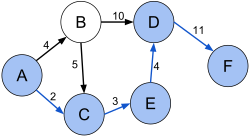floyd-warshall-shortest
v1.0.2
Published
Implementation of Floy-Warshall's algorithm for finding shortest paths in a directed weighted graph.
Downloads
41
Maintainers
Readme
floyd-warshall-shortest
The Floyd–Warshall algorithm finds the shortest paths (and distances) in a directed weighted graph with positive or negative edge weights. For more information read: https://en.wikipedia.org/wiki/Floyd%E2%80%93Warshall_algorithm
The package implements three functions returning
- the shortestPath between two nodes
- the shortestPath visiting all nodes in a list (in any order). This operation is quite slow for a long list of nodes (>10), since it evaluates all permutations.
- the shortest distance between two nodes
Undirected graphs are supported by passing false as the second parameter to the constructor. In this case, for each edge passed to the constructor its symmetric edge is also added to the graph.
Install
npm i floyd-warshall-shortestUsage
The following graph is used in the examples below:
Javascript
fw = require('floyd-warshall-shortest');
edges = [
{ from: 'A', to: 'B', weight: 4 },
{ from: 'A', to: 'C', weight: 2 },
{ from: 'B', to: 'C', weight: 5 },
{ from: 'B', to: 'D', weight: 10 },
{ from: 'C', to: 'E', weight: 3 },
{ from: 'E', to: 'D', weight: 4 },
{ from: 'D', to: 'F', weight: 11 },
];
graph = new fw.FloydWarshall(edges);
path = graph.getShortestPath('A', 'F');
// [ 'A', 'C', 'E', 'D', 'F' ]
distance = graph.getShortestDistance('A', 'F');
// 20
path = graph.getShortestVisitingPath(['A', 'B', 'F']);
// [ 'A', 'B', 'D', 'F' ]Typescript
import { FloydWarshall, Edge } from 'floyd-warshall-shortest';
const edges: Edge<string>[] = [
{ from: 'A', to: 'B', weight: 4 },
{ from: 'A', to: 'C', weight: 2 },
{ from: 'B', to: 'C', weight: 5 },
{ from: 'B', to: 'D', weight: 10 },
{ from: 'C', to: 'E', weight: 3 },
{ from: 'E', to: 'D', weight: 4 },
{ from: 'D', to: 'F', weight: 11 },
];
const graph = new FloydWarshall(edges, false); // undirected edges!!!
const path = graph.getShortestVisitingPath(['A', 'B', 'F']);
// ['B', 'A', 'C', 'E', 'D', 'F']
....Available constructors
const nodes = ['a', 'b', 'c'];
const edges = [{ from: 'a', to: 'c', weight: 1 }];
/**
* FloydWarshall<T>(nodes: T[], edges: Edge<T>[], directed = true)
*
* nodes are explicitly specified.
*
*/
// creates a directed graph with the explicit set of nodes and edges.
const g1 = new FloydWarshall(nodes, edges);
// creates an undirected graph with the explicit set of nodes and edges.
const g2 = new FloydWarshall(nodes, edges, false);
/**
* FloydWarshall<T>(edges: Edge<T>[], directed = true)
*
* nodes are implicitly defined from edges
*
*/
// creates a directed graph with the imllicit set of nodes: {'a', 'c'}
const g3 = new FloydWarshall(edges);
// creates an undirected graph with the implicit set of nodes: {'a', 'c'}
const g4 = new FloydWarshall(edges, false);
